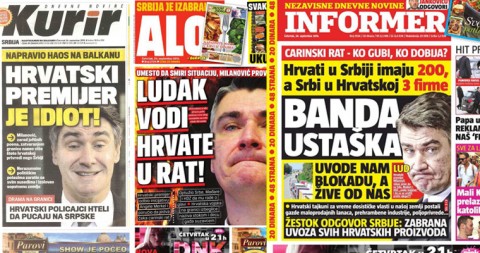Trial for the Crime in Trnje – Justice Delayed is Justice Denied

 Only two trial days have been held since the filing of the indictment for the war crime in the case of Trnje two years ago, while the Ministry of Defence has been refusing since the beginning of the trial to act on the final decision rendered by the Commissioner for Information of Public Importance (Commissioner) and inform the public about the present status of the two defendants in the Serbian Army (VS). The Humanitarian Law Center (HLC) emphasizes that the delays in the beginning of the trial and the unlawful acts of the respective Ministry degrade the trials for the crimes committed during the nineteen-nineties and discourage victims who have been waiting for justice for 16 years now.
Only two trial days have been held since the filing of the indictment for the war crime in the case of Trnje two years ago, while the Ministry of Defence has been refusing since the beginning of the trial to act on the final decision rendered by the Commissioner for Information of Public Importance (Commissioner) and inform the public about the present status of the two defendants in the Serbian Army (VS). The Humanitarian Law Center (HLC) emphasizes that the delays in the beginning of the trial and the unlawful acts of the respective Ministry degrade the trials for the crimes committed during the nineteen-nineties and discourage victims who have been waiting for justice for 16 years now.









 On 17 August 2015, the Humanitarian Law Center (HLC) filed criminal charges against two unidentified members of the 86th Detachment of the Special Police Unit (SPU) of the Ministry of the Interior of the Republic of Serbia (MoI), on reasonable suspicion that they killed 53 ethnic Albanian civilians, including 24 women and 23 children, on 17 April 1999 in the village of Poklek (Municipality of Glogovac). Criminal charges were also filed against Dragan Obradovic, former commander of the 86th Detachment of the SPU, and against the commander of the company which the perpetrators belonged to, on the charges of not preventing the crime and not punishing the perpetrators.
On 17 August 2015, the Humanitarian Law Center (HLC) filed criminal charges against two unidentified members of the 86th Detachment of the Special Police Unit (SPU) of the Ministry of the Interior of the Republic of Serbia (MoI), on reasonable suspicion that they killed 53 ethnic Albanian civilians, including 24 women and 23 children, on 17 April 1999 in the village of Poklek (Municipality of Glogovac). Criminal charges were also filed against Dragan Obradovic, former commander of the 86th Detachment of the SPU, and against the commander of the company which the perpetrators belonged to, on the charges of not preventing the crime and not punishing the perpetrators. 
 The First Basic Court in Belgrade passed two judgments ordering the Republic of Serbia to pay compensation to six Kosovo Albanians from Glogovac, in amounts ranging from 125,000 to 370,000 dinars, because of Serbia’s responsibility for torture and unlawful detention committed by members of the Ministry of the Interior (MoI). Although the judgments established the right to compensation for violations of basic human rights, the Humanitarian Law Center (HLC) emphasizes that the amounts awarded are unjustifiably low and the rationale of the judgments indicates the intention of reducing the state’s responsibility for the widespread torture against Kosovo Albanians in 1999. The HLC lawyers have filed appeals for the judgments to the Court of Appeal in Belgrade.
The First Basic Court in Belgrade passed two judgments ordering the Republic of Serbia to pay compensation to six Kosovo Albanians from Glogovac, in amounts ranging from 125,000 to 370,000 dinars, because of Serbia’s responsibility for torture and unlawful detention committed by members of the Ministry of the Interior (MoI). Although the judgments established the right to compensation for violations of basic human rights, the Humanitarian Law Center (HLC) emphasizes that the amounts awarded are unjustifiably low and the rationale of the judgments indicates the intention of reducing the state’s responsibility for the widespread torture against Kosovo Albanians in 1999. The HLC lawyers have filed appeals for the judgments to the Court of Appeal in Belgrade.